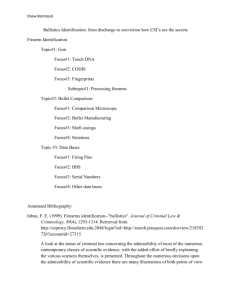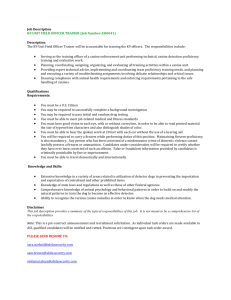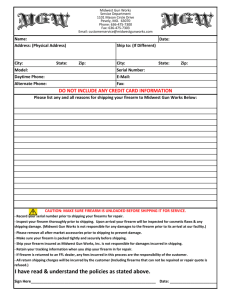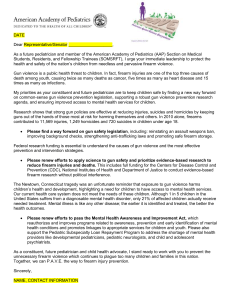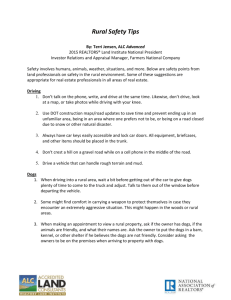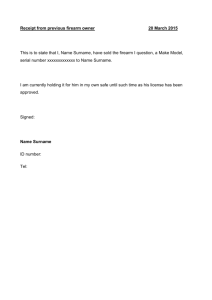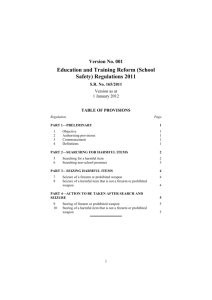Page 458 Title 76. Utah Criminal Code Chapter 3. Punishments 76
advertisement
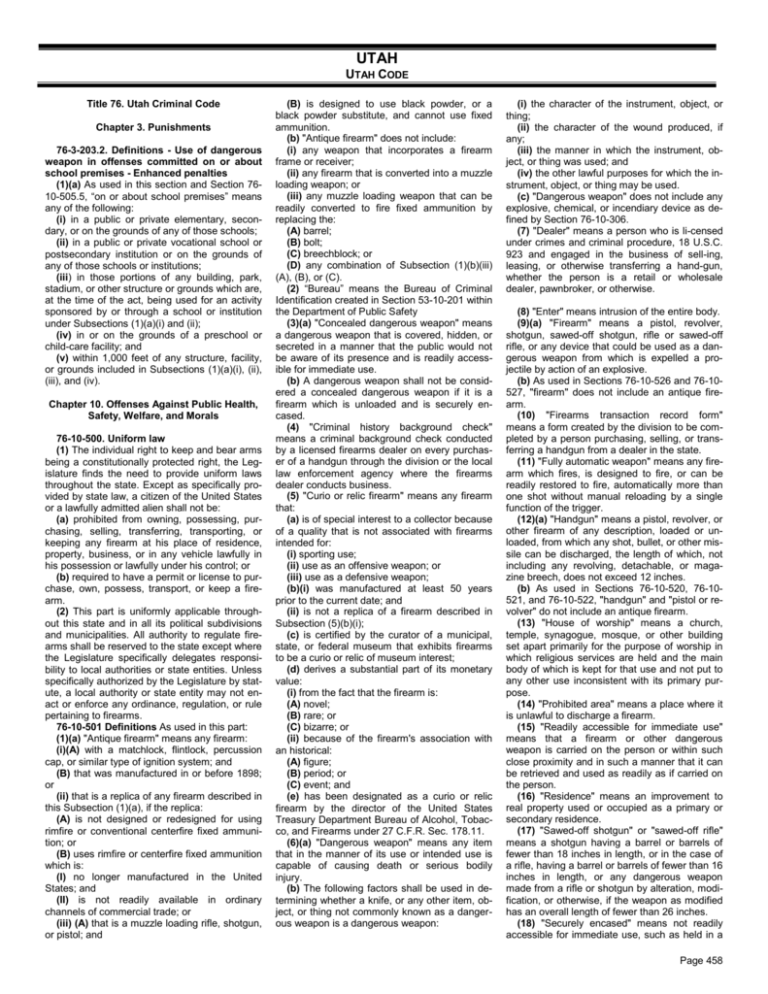
UTAH UTAH CODE Title 76. Utah Criminal Code Chapter 3. Punishments 76-3-203.2. Definitions - Use of dangerous weapon in offenses committed on or about school premises - Enhanced penalties (1)(a) As used in this section and Section 7610-505.5, “on or about school premises” means any of the following: (i) in a public or private elementary, secondary, or on the grounds of any of those schools; (ii) in a public or private vocational school or postsecondary institution or on the grounds of any of those schools or institutions; (iii) in those portions of any building, park, stadium, or other structure or grounds which are, at the time of the act, being used for an activity sponsored by or through a school or institution under Subsections (1)(a)(i) and (ii); (iv) in or on the grounds of a preschool or child-care facility; and (v) within 1,000 feet of any structure, facility, or grounds included in Subsections (1)(a)(i), (ii), (iii), and (iv). Chapter 10. Offenses Against Public Health, Safety, Welfare, and Morals 76-10-500. Uniform law (1) The individual right to keep and bear arms being a constitutionally protected right, the Legislature finds the need to provide uniform laws throughout the state. Except as specifically provided by state law, a citizen of the United States or a lawfully admitted alien shall not be: (a) prohibited from owning, possessing, purchasing, selling, transferring, transporting, or keeping any firearm at his place of residence, property, business, or in any vehicle lawfully in his possession or lawfully under his control; or (b) required to have a permit or license to purchase, own, possess, transport, or keep a firearm. (2) This part is uniformly applicable throughout this state and in all its political subdivisions and municipalities. All authority to regulate firearms shall be reserved to the state except where the Legislature specifically delegates responsibility to local authorities or state entities. Unless specifically authorized by the Legislature by statute, a local authority or state entity may not enact or enforce any ordinance, regulation, or rule pertaining to firearms. 76-10-501 Definitions As used in this part: (1)(a) "Antique firearm" means any firearm: (i)(A) with a matchlock, flintlock, percussion cap, or similar type of ignition system; and (B) that was manufactured in or before 1898; or (ii) that is a replica of any firearm described in this Subsection (1)(a), if the replica: (A) is not designed or redesigned for using rimfire or conventional centerfire fixed ammunition; or (B) uses rimfire or centerfire fixed ammunition which is: (I) no longer manufactured in the United States; and (II) is not readily available in ordinary channels of commercial trade; or (iii) (A) that is a muzzle loading rifle, shotgun, or pistol; and (B) is designed to use black powder, or a black powder substitute, and cannot use fixed ammunition. (b) "Antique firearm" does not include: (i) any weapon that incorporates a firearm frame or receiver; (ii) any firearm that is converted into a muzzle loading weapon; or (iii) any muzzle loading weapon that can be readily converted to fire fixed ammunition by replacing the: (A) barrel; (B) bolt; (C) breechblock; or (D) any combination of Subsection (1)(b)(iii) (A), (B), or (C). (2) “Bureau” means the Bureau of Criminal Identification created in Section 53-10-201 within the Department of Public Safety (3)(a) "Concealed dangerous weapon" means a dangerous weapon that is covered, hidden, or secreted in a manner that the public would not be aware of its presence and is readily accessible for immediate use. (b) A dangerous weapon shall not be considered a concealed dangerous weapon if it is a firearm which is unloaded and is securely encased. (4) "Criminal history background check" means a criminal background check conducted by a licensed firearms dealer on every purchaser of a handgun through the division or the local law enforcement agency where the firearms dealer conducts business. (5) "Curio or relic firearm" means any firearm that: (a) is of special interest to a collector because of a quality that is not associated with firearms intended for: (i) sporting use; (ii) use as an offensive weapon; or (iii) use as a defensive weapon; (b)(i) was manufactured at least 50 years prior to the current date; and (ii) is not a replica of a firearm described in Subsection (5)(b)(i); (c) is certified by the curator of a municipal, state, or federal museum that exhibits firearms to be a curio or relic of museum interest; (d) derives a substantial part of its monetary value: (i) from the fact that the firearm is: (A) novel; (B) rare; or (C) bizarre; or (ii) because of the firearm's association with an historical: (A) figure; (B) period; or (C) event; and (e) has been designated as a curio or relic firearm by the director of the United States Treasury Department Bureau of Alcohol, Tobacco, and Firearms under 27 C.F.R. Sec. 178.11. (6)(a) "Dangerous weapon" means any item that in the manner of its use or intended use is capable of causing death or serious bodily injury. (b) The following factors shall be used in determining whether a knife, or any other item, object, or thing not commonly known as a dangerous weapon is a dangerous weapon: (i) the character of the instrument, object, or thing; (ii) the character of the wound produced, if any; (iii) the manner in which the instrument, object, or thing was used; and (iv) the other lawful purposes for which the instrument, object, or thing may be used. (c) "Dangerous weapon" does not include any explosive, chemical, or incendiary device as defined by Section 76-10-306. (7) "Dealer" means a person who is li-censed under crimes and criminal procedure, 18 U.S.C. 923 and engaged in the business of sell-ing, leasing, or otherwise transferring a hand-gun, whether the person is a retail or wholesale dealer, pawnbroker, or otherwise. (8) "Enter" means intrusion of the entire body. (9)(a) "Firearm" means a pistol, revolver, shotgun, sawed-off shotgun, rifle or sawed-off rifle, or any device that could be used as a dangerous weapon from which is expelled a projectile by action of an explosive. (b) As used in Sections 76-10-526 and 76-10527, "firearm" does not include an antique firearm. (10) "Firearms transaction record form" means a form created by the division to be completed by a person purchasing, selling, or transferring a handgun from a dealer in the state. (11) "Fully automatic weapon" means any firearm which fires, is designed to fire, or can be readily restored to fire, automatically more than one shot without manual reloading by a single function of the trigger. (12)(a) "Handgun" means a pistol, revolver, or other firearm of any description, loaded or unloaded, from which any shot, bullet, or other missile can be discharged, the length of which, not including any revolving, detachable, or magazine breech, does not exceed 12 inches. (b) As used in Sections 76-10-520, 76-10521, and 76-10-522, "handgun" and "pistol or revolver" do not include an antique firearm. (13) "House of worship" means a church, temple, synagogue, mosque, or other building set apart primarily for the purpose of worship in which religious services are held and the main body of which is kept for that use and not put to any other use inconsistent with its primary purpose. (14) "Prohibited area" means a place where it is unlawful to discharge a firearm. (15) "Readily accessible for immediate use" means that a firearm or other dangerous weapon is carried on the person or within such close proximity and in such a manner that it can be retrieved and used as readily as if carried on the person. (16) "Residence" means an improvement to real property used or occupied as a primary or secondary residence. (17) "Sawed-off shotgun" or "sawed-off rifle" means a shotgun having a barrel or barrels of fewer than 18 inches in length, or in the case of a rifle, having a barrel or barrels of fewer than 16 inches in length, or any dangerous weapon made from a rifle or shotgun by alteration, modification, or otherwise, if the weapon as modified has an overall length of fewer than 26 inches. (18) "Securely encased" means not readily accessible for immediate use, such as held in a Page 458 gun rack, or in a closed case or container, whether or not locked, or in a trunk or other storage area of a motor vehicle, not including a glove box or console box. (19) "State entity" means a department, commission, board, council, agency, institution, officer, corporation, fund, division, office, committee, authority, laboratory, library, unit, bureau, panel, or other administrative unit of the state. (20) "Violent felony" has the same meaning as defined in Section 76-3-203.5. 76-10-502. When weapon deemed loaded (1) For the purpose of this chapter, any pistol, revolver, shotgun, rifle, or other weapon described in this part shall be deemed to be loaded when there is an unexpended cartridge, shell, or projectile in the firing position. (2) Pistols and revolvers shall also be deemed to be loaded when an unexpended cartridge, shell, or projectile is in a position whereby the manual operation of any mechanism once would cause the unexpended cartridge, shell, or projectile to be fired. (3) A muzzle loading firearm shall be deemed to be loaded when it is capped or primed and has a powder charge and ball or shot in the barrel or cylinders. 76-10-503. Restrictions on possession, purchase, transfer, and ownership of dangerous weapons by certain persons (1) For purposes of this section: (a) A Category I restricted person is a person who: (i) has been convicted of any violent felony as defined in Section 76-3-203.5; (ii) is on probation or parole for any felony; (iii) is on parole from a secure facility as defined in Section 62A-7-101; or (iv) within the last ten years has been adjudicated delinquent for an offense which if committed by an adult would have been a violent felony as defined in Section 76-3-203.5. (b) A Category II restricted person is a person who: (i) has been convicted of or is under indictment for any felony; (ii) within the last seven years has been adjudicated delinquent for an offense which if committed by an adult would have been a felony; (iii) is an unlawful user of a controlled substance as defined in Section 58-37-2; (iv) is in possession of a dangerous weapon and is knowingly and intentionally in unlawful possession of a Schedule I or II controlled substance as defined in Section 58-37-2; (v) has been found not guilty by reason of insanity for a felony offense; (vi) has been found mentally incompetent to stand trial for a felony offense; (vii) has been adjudicated as mentally defective as provided in the Brady Handgun Violence Prevention Act, Pub. L. No. 103-159, 107 Stat. 1536 (1993), or has been committed to a mental institution; (viii) is an alien who is illegally or unlawfully in the United States; (ix) has been dishonorably discharged from the armed forces; or (x) has renounced his citizenship after having been a citizen of the United States. (2) A Category I restricted person who intentionally or knowingly agrees, consents, offers, or arranges to purchase, transfer, possess, use, or have under his custody or control, or who intentionally or knowingly purchases, transfers, possesses, uses, or has under his custody or control: (a) any firearm is guilty of a second degree felony; or (b) any dangerous weapon other than a firearm is guilty of a third degree felony. (3) A Category II restricted person who purchases, transfers, possesses, uses, or has under his custody or control: (a) any firearm is guilty of a third degree felony; or (b) any dangerous weapon other than a firearm is guilty of a class A misdemeanor. (4) A person may be subject to the restrictions of both categories at the same time. (5) If a higher penalty than is prescribed in this section is provided in another section for one who purchases, transfers, possesses, uses, or has under this custody or control any dangerous weapon, the penalties of that section control. (6) It is an affirmative defense to a charge based on the definition in Subsection (1)(b)(iv) that the person was: (a) in possession of a controlled substance pursuant to a lawful order of a practitioner for use of a member of the person's household or for administration to an animal owned by the person or a member of the person's household; or (b) otherwise authorized by law to possess the substance. 76-10-505.5. Possession of a dangerous weapon, firearm, or sawed-off shotgun on or about school premises - Penalties (1) A person may not possess any dangerous weapon, firearm, or sawed-off shotgun, as those terms are defined in Section 76-10-501, at a place that the person knows, or has reasonable cause to believe, is on or about school premises as defined in Subsection 76-3-203.2 (1). (2)(a) Possession of a dangerous weapon on or about school premises is a class B misdemeanor. (b) Possession of a firearm or sawed-off shotgun on or about school premises is a class A misdemeanor. (3) This section does not apply if: (a) the person is authorized to possess a firearm as provided under Section 53-5-704, 53-5705, 76-10-511, or 76-10-523 or as otherwise authorized by law; (b) the possession is approved by the responsible school administrator; (c) the item is present or to be used in connection with a lawful, approved activity and is in the possession or under the control of the person responsible for its possession or use; or (d) the possession is: (i) at the person's place of residence or on the person's property; (ii) in any vehicle lawfully under the person's control, other than a vehicle owned by the school or used by the school to transport students; or (iii) at the person's place of business which is not located in the areas described in Subsection 76-3-203.2 (1)(a)(i), (ii), or (iv). (4) This section does not prohibit prosecution of a more serious weapons offense that may occur on or about school premises. 76-10-509. Possession of dangerous weapon by minor (1) A minor under 18 years of age may not possess a dangerous weapon unless he: (a) has the permission of his parent or guardian to have the weapon; or (b) is accompanied by a parent or guardian while he has the weapon in his possession. (2) Any minor under 14 years of age in possession of a dangerous weapon shall be accompanied by a responsible adult. (3) Any person who violates this section is guilty of: (a) a class B misdemeanor upon the first offense; and (b) a class A misdemeanor for each subsequent offense. 76-10-509.4. Prohibition of possession of certain weapons by minors (1) A minor under 18 years of age may not possess a handgun. (2) Except as provided by federal law, a minor under 18 years of age may not possess the following: (a) a sawed-off rifle or sawed-off shotgun; or (b) a fully automatic weapon. (3) Any person who violates Subsection (1) is guilty of: (a) a class B misdemeanor upon the first offense; and (b) a class A misdemeanor for each subsequent offense. (4) Any person who violates Subsection (2) is guilty of a third degree felony. 76-10-509.5. Penalties for providing certain weapons to a minor (1) Any person who provides a handgun to a minor when the possession of the handgun by the minor is a violation of Section 76-10-509.4 is guilty of: (a) a class B misdemeanor upon the first offense; and (b) a class A misdemeanor for each subsequent offense. (2) Any person who transfers in violation of applicable state or federal law a sawed-off rifle, sawed-off shotgun, or fully automatic weapon to a minor is guilty of a third degree felony. 76-10-509.6. Parent or guardian providing firearm to violent minor (1) A parent or guardian may not intentionally or knowingly provide a firearm to, or permit the possession of a firearm by, any minor who has been convicted of a violent felony as defined in Section 76-3-203.5 or any minor who has been adjudicated in juvenile court for an offense which would constitute a violent felony if the minor were an adult. (2) Any person who violates this section is guilty of: (a) a class A misdemeanor upon the first offense; and (b) a third degree felony for each subsequent offense. 76-10-509.7. Parent or guardian knowing of minor's possession of dangerous weapon Any parent or guardian of a minor who knows that the minor is in possession of a dangerous weapon in violation of Section 76-10-509 or a firearm in violation of Section 76-10-509.4 and fails to make reasonable efforts to remove the firearm from the minor's possession is guilty of a class B misdemeanor. 76-10-509.9. Sales of firearms to juveniles (1) A person may not sell any firearm to a minor under 18 years of age unless the minor is accompanied by a parent or guardian. (2) Any person who violates this section is guilty of a third degree felony. 76-10-511. Possession of loaded weapon at residence authorized Except for persons described in Section 76-10-503 and 18 U.S.C. Sec. 922(g) and as otherwise prescribed in this part, a person may have a loaded firearm: (1) at the person's place of residence, Page 459 including any temporary residence or camp; or (2) on the person's real property. 76-10-520. Number or mark assigned to pistol or revolver by Department of Public Safety The Department of Public Safety upon request may assign a distinguishing number or mark of identification to any pistol or revolver whenever it is without a manufacturer's number, or other mark of identification or whenever the manufacturer's number or other mark of identification or the distinguishing number or mark assigned by the Department of Public Safety has been destroyed or obliterated. 76-10-521. Unlawful marking of pistol or revolver (1) Any person who places or stamps on any pistol or revolver any number except one assigned to it by the Department of Public Safety is guilty of a class A misdemeanor. (2) This section does not prohibit restoration by the owner of the name of the maker, model, or of the original manufacturer's number or other mark of identification when the restoration is authorized by the Department of Public Safety, nor prevent any manufacturer from placing in the ordinary course of business the name of the make, model, manufacturer's number, or other mark of identification upon a new pistol or revolver. 76-10-522. Alteration of number or mark on pistol or revolver Any person who changes, alters, removes, or obliterates the name of the maker, the model, manufacturer's number, or other mark of identification, including any distinguishing number or mark assigned by the Department of Public Safety, on any pistol or revolver, without first having secured written permission from the Department of Public Safety to make the change, alteration, or removal, is guilty of a class A misdemeanor. 76-10-523. Persons exempt from weapons laws (1) This part and Title 53, Chapter 5, Part 7, Concealed Weapon Act, do not apply to any of the following: (a) a United States marshal; (b) a federal official required to carry a firearm; (c) a peace officer of this or any other jurisdiction; (d) a law enforcement official as defined and qualified under Section 53-5-711; (e) a judge as defined and qualified under Section 53-5-711; (f) a common carrier while engaged in the regular and ordinary transport of firearms as merchandise; or (g) a nonresident traveling in or through the state, provided that any firearm is: (i) unloaded; and (ii) securely encased as defined in Section 76-10-501. (2) The provisions of Subsections 76-10504(1) and (2), and Section 76-10-505 do not apply to any person to whom a permit to carry a concealed firearm has been issued: (a) pursuant to Section 53-5-704; or (b) by another state or county. 76-10-524. Purchase of firearms pursuant to federal law This part will allow purchases of firearms and ammunition pursuant to U.S.C. Title 18 Chapter 44 Sec. 922b(3). 76-10-526. Criminal background check prior to purchase of a firearm - Fee - Exemption for concealed firearm permit holders (1) For purposes of this section, "valid permit to carry a concealed firearm" does not include a temporary permit issued pursuant to Section 535-705. (2)(a)To establish personal identification and residence in this state for purposes of this part, a dealer shall require an individual receiving a firearm to present one photo identification on a form issued by a governmental agency of the state. (b) A dealer may not accept a driving privilege card issued in accordance with section 53-3-207 as proof of identification for the purpose of establishing personal identification and residence in this state as required under this subsection (2). (3) A criminal history background check is required for the sale of a firearm by a licensed firearm dealer in the state. (4)(a) An individual, except a dealer, purchasing a firearm from a dealer shall consent in writing to a criminal background check, on a form provided by the bureau. (b) The form shall contain the following information: (i) the dealer identification number; (ii) the name and address of the individual receiving the firearm; (iii) the date of birth, height, weight, eye color, and hair color of the individual receiving the firearm; and (iv) the Social Security number or any other identification number of the individual receiving the firearm. (5)(a) The dealer shall send the form required by Subsection (4) to the bureau immediately upon its completion. (b) A dealer may not sell or transfer a firearm to an individual until the dealer has provided the bureau with the information in Subsection (4) and has received approval from the bureau under Subsection (7). (6) The dealer shall make a request for criminal history background information by telephone or other electronic means to the bureau and shall receive approval or denial of the inquiry by telephone or other electronic means. (7) When the dealer calls for or requests a criminal history background check, the bureau shall: (a) review the criminal history files, including juvenile court records, to determine if the individual is prohibited from purchasing, possessing, or transferring a firearm by state or federal law; (b) inform the dealer that: (i) the records indicate the individual is so prohibited; or (ii) the individual is approved for purchasing, possessing, or transferring a firearm; (c) provide the dealer with a unique transacttion number for that inquiry; and (d) provide a response to the requesting dealer during the call for a criminal background, or by return call, or other electronic means, without delay, except in case of electronic failure or other circumstances beyond the control of the bureau, the bureau shall advise the dealer of the reason for the delay and give the dealer an estimate of the length of the delay. (8)(a) The bureau may not maintain any records of the criminal history background check longer than 20 days from the date of the dealer's request if the bureau determines that the individual receiving the gun is not prohibited from purchasing, possessing, or transferring the fire-arm under state or federal law. (b) However, the bureau shall maintain a log of requests containing the dealer's federal firearms number, the transaction number, and the transaction date for a period of 12 months. (9) If the criminal history background check discloses information indicating that the individual attempting to purchase the firearm is prohibited from purchasing, possessing, or transferring a firearm, the bureau shall inform the law enforcement agency in the jurisdiction where the person resides. (10) If an individual is denied the right to purchase a firearm under this section, the individual may review the individual’s criminal history information and may challenge or amend the information as provided in Section 53-10-108. (11) The bureau shall make rules as provided in Title 63g, Chapter 3, Utah Administrative Rulemaking Act, to ensure the identity, confidentiality, and security of all records provided by the division pursuant to this part are in conformance with the requirements of the Brady Handgun Violence Prevention Act, Pub. L. No. 103-159, 107 Stat. 1536 (1993). (12)(a)(i) A dealer shall collect a criminal history background check fee related to the sale of a firearm under this section, which is $7.50. (ii)This fee remains in effect until changed by the bureau through the process under Section 63J-1-504. (b)(i) The dealer shall forward at one time all fees collected for criminal history background checks performed during the month to the bureau by the last day of the month following the sale of a firearm. (ii)The bureau shall deposit the fees in the General Fund as dedicated credits to cover the cost of administering and conducting the criminal history background check program. (13) An individual with a concealed firearm permit issued pursuant to Title 53, Chapter 5, Part 7, Concealed Firearm Act, is exempt from the background check and corresponding fee required in this section for the purchase of a firearm if: (a) the individual presents the individual’s concealed firearm permit to the dealer prior to purchase of the firearm; and (b) the dealer verifies with the division that the individual's concealed firearm permit is valid. 76-10-527. Penalties (1) A dealer is guilty of a class A misdemeanor who willfully and intentionally: (a) requests, obtains, or seeks to obtain criminal history background information under false pretenses; (b) disseminates criminal history background information; or (c) violates Section 76-10-526. (2) A person who purchases or transfers a firearm is guilty of a felony of the third degree who willfully and intentionally makes a false statement of the information required for a criminal background check in Section 76-10-526. (3) Except as otherwise provided in Subsection (1), a dealer is guilty of a felony of the third degree if the dealer willfully and intentionally sells or transfers a firearm in violation of this part. (4) A person is guilty of a felony of the third degree if the person purchases a firearm with the intent to: (a) resell or otherwise provide a firearm to any person who is ineligible to purchase or receive a firearm from a dealer a firearm; or (b) transport a firearm out of this state to be resold to an ineligible person. [Current through the 2010 General Session] Page 460

